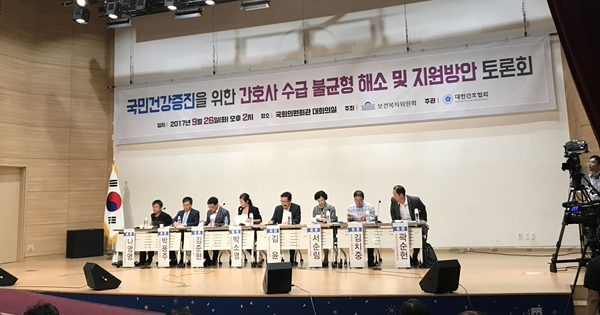South Korea’s nursing shortage should be tackled by a state intervention with the government making detailed plans and managing them in the long run, an expert said Tuesday.
“We’re having a problem in the supply of nurses because the government failed to set up detailed healthcare plans and manage related workers,” said Park So-young박소영, a professor at Shinhan University’s College of Nursing, during a debate on how to resolve the imbalance of the demand and supply of nurses, at the National Assembly.
“After assessing the current situation, the government should make a plan to provide an appropriate number of workers for healthcare and medical services and manage them,” she went on to say.
According to Park, a state management of health and medical care workers should be an integrated one, taking into account all aspects such as planning, financing, education, structure, and regulation.
“These factors should be linked with legal and systematic measures. The government should also properly use regulative and compensational strategies for such measures to be effective,” she said.
Park said Korea should have a stated goal to increase the number of nurses, essentially considering its labor market and the environment for related education.
“The government should not increase the number of admissions at nursing colleges but improve the work environment for nurses by guaranteeing certain employment conditions,” Park said.
She suggested the government prioritize and implement related policies to secure more nurses at hospitals first.
“The government should expand the mandatory number of nurses hired at medical institutions. If hospitals do not abide by the new rule, they should face sanctions. If they do, they should be financially rewarded,” she said.
Park also called for an overhaul of the national health insurance payment system to guarantee financial rewards for employing more nurses.

Seo Sun-rim서순림, vice president of the Korean Nurses Association대한간호협회, also urged the government to intervene in the nursing market actively. She suggested the government pay more to nurses by revising the hospitalization payment system and forcing hospitals to hire a certain share of nurses by revising the nursing rates on a scaled basis.
“Most of the medical services provided for hospitalized patients are nursing services. So, we should revamp the hospitalization payment system to give more pay to nurses,” Seo said.
“The current rates are 40 percent for physicians, 25 percent for nurses and 35 percent for ward managers. But, the rate for nurses should go up to allow higher incentives for employing more nurses.”
Seo added that the government should make the nursing rates on a scaled basis feasible, which would “help re-adjust excessive supply of beds and improve small- and medium-sized hospitals’ competitiveness.”
The base criteria for nursing rates should be the same with that for mandatory employment of nurses under the Medical Service Act so that the government can ensure “legal coercion” on hiring nurses, she said.
Na Young-myeong나영명, director of planning and policy at the Confederation of Labor Union of the Health and Medical Service Industries, said the National Assembly should pass a proposed bill, “Special Act on Human Resources Support in Health and Medical Services” to lay the legal ground to tackle the issue of the nursing shortage.
“If the bill passes, the law will force the government to make a comprehensive plan for human resources management for the healthcare industry and conduct a field survey. Based on this, they will devise up measures for more supply of nurses,” said Na.
“This will solve more than 70 percent of the issues currently being raised,” he said.
Hospital operators agreed that a state intervention would help resolve the problem of the nursing shortage, saying the government should aim at increasing the number of nurses first.
Korean Hospital Association대한병원협회 Vice President Park Yong-joo박영주 said increasing the number of nurses will be a prerequisite to improve their working conditions.
“We have to secure an absolute number of nursing professionals. We could introduce a college transfer system, considering the timing of turnout of nurses. We can teach them intensively for 2-3 years and produce registered nurses as fast as we can,” he said.
The Ministry of Health and Welfare said it would do its best to reward hospitals that recruit more nurses financially.
“I agree that it is more important to improve work environment to increase nurses. We will seek to include more pay to nurses in the government’s program to expand health insurance coverage,” said Kwak Soon-heon곽순헌, head of the ministry’s medical policy and resource division.
“We’re now focusing on improving the working environment for night-shift nurses. To give them higher incentives, we’re trying our best to secure related budget so that the government's budget can cover such incentives.”
On improving the work environment, the ministry will set up guidelines, Kwak said.
“We will make and distribute guidelines to prevent human rights violation cases at hospitals such as the recent one where nurses were forced to adjust their timing of pregnancy due to heavy workloads,” he said. He added that the government is discussing whether to set up a separate body to fully take care of the issue.

